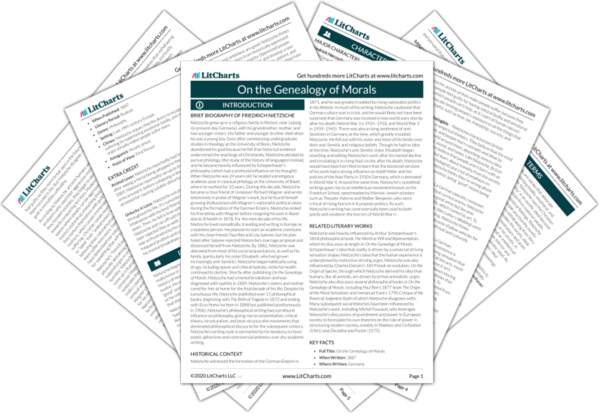Richard Wagner Quotes in On the Genealogy of Morals
What is the meaning of ascetic ideals?

Unlock explanations and citation info for this and every other On the Genealogy of Morals quote.
Plus so much more...
Get LitCharts A+At any rate, this should be the case with all mortals who are sound in mind and body, who are far from regarding their delicate balance between ‘animal’ and ‘angel’ as necessarily an objection to existence—the brightest and most insightful of them, such as Goethe and Hafiz, have even seen in this another of life's charms. Such ‘conflicts’ actually make life all the more enticing.
He suddenly realized that more could be effected by the novelty of the Schopenhauerian […] notion of the sovereignty of music, as Schopenhauer understood it; music set apart from and distinguished from all the other arts, music as the independent art-in-itself, not like the other arts, affording images of the phenomenal world, but rather speaking the language of the will itself, straight out of the ‘abyss,’ as its most personal, original and direct manifestation.

Richard Wagner Quotes in On the Genealogy of Morals
What is the meaning of ascetic ideals?

Unlock explanations and citation info for this and every other On the Genealogy of Morals quote.
Plus so much more...
Get LitCharts A+At any rate, this should be the case with all mortals who are sound in mind and body, who are far from regarding their delicate balance between ‘animal’ and ‘angel’ as necessarily an objection to existence—the brightest and most insightful of them, such as Goethe and Hafiz, have even seen in this another of life's charms. Such ‘conflicts’ actually make life all the more enticing.
He suddenly realized that more could be effected by the novelty of the Schopenhauerian […] notion of the sovereignty of music, as Schopenhauer understood it; music set apart from and distinguished from all the other arts, music as the independent art-in-itself, not like the other arts, affording images of the phenomenal world, but rather speaking the language of the will itself, straight out of the ‘abyss,’ as its most personal, original and direct manifestation.











